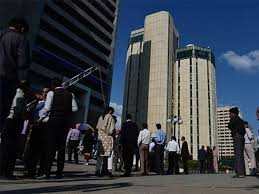By Muhammad Luqman
Pakistan has fallen three places on the Word Bank’s Ease of Doing Business Index and is now ranked a lowly 147th among 190 economies, denting the government’s pro-business image ahead of next general elections.
The index is mostly used as a guide by foreign investors to learn more about a country, aiding decisions on pouring in money in the economy.
Pakistan, however, slipped from its last year’s rating despite the introduction of some reforms in areas of starting a business and making international trade relatively easier. If one government department is to be blamed for the overall poor performance, it is the Ministry of Finance, as the country’s ranking nosedived on the indicators of paying taxes and getting credit.
The findings of the report serve as a reminder to the PML-N government that has claimed making Pakistan an easier place to do business in, while also helping it become one of the fastest 25 growing economies of the world. Instead, the country was ranked at 43 from the bottom on the influential global index.
The World Bank released the Doing Business 2018 report on Tuesday that covers 190 economies and measures how close each economy is to global best practices in business regulations.
In South Asia, Bhutan, at the 75th place in the Doing Business rankings, is the highest-ranked economy followed by India (100) and Nepal (105). Pakistan, at the 147th position, was at number 6 in South Asia followed by Bangladesh (177) and Afghanistan 183.
International investors consult the report and the Global Competitiveness Index of the World Economic Forum before taking decisions about their investment plans.
This year, Pakistan did make it easier to ‘start a business’, ‘register property’, ‘strengthened minority shareholders protection’ and made it easier to ‘do trade across the border’. It also introduced electronic processing of documents for exports and imports and strengthened port infrastructure.
Pakistan lost 16 positions on the indicator of paying taxes, standing at 172, according to the 2018 report. Last year, Pakistan’s ranking was 156. One of the reasons behind the dismal performance was the increase in overall tax rates that surged to 33.8% of total profits.
Although the PML-N government reduced the overall corporate tax rate to 30%, it imposed Super Tax on big companies that jacked up tax contribution. Due to multiplicity of taxes, people and companies made 47 tax payments every year which consumed 311.5 hours, according to the report.
Instead of broadening the tax base, the government relied heavily on the existing extremely narrow tax base to meet its additional revenue requirements. This made business uncompetitive.
Pakistan also lost 23 positions on the indicator of getting credit for doing business. The country stood at 105th position this year as against 82nd last year. Due to the government’s growing budget financing needs, very little capital was left for the business to expand.
On the indices of starting a business and registering property the country lost one position standing at 142 and 170, respectively. There are 12 kinds of procedures that require about 18 days to complete them. Similarly, for registering a property about 155 days were required.
Although the country improved its position by three notches, it still remained at 167th on the index of getting electricity. There were about six kinds of procedures that an applicant has to complete for getting a connection. The country did not make any progress on the issue of reliability of supply and transparency in electricity tariffs.
Survey results showed that despite the government’s focus on the energy sector the people perceptions did not change.
On the index of dealing with construction permits, the country improved its ranking by nine notches and stood at 141. There are 15 types of procedures that require 252 days for an investor to get a construction permit.
On the index of trading across the border, Pakistan did improve its position by one notch but it still remained at 171 -among the bottom 20 economies. For fulfilling border compliance, an exporter needs 75 hours and the cost of documentary compliance was $257. The cost of border compliance was $457.
In the case of imports, the cost of documentary compliance is $735 and border compliance is $936.6.
On the index of enforcing contracts, the country was ranked at 156 – a notch above last year’s ranking. Similarly, Pakistan improved three positions on the index of resolving insolvency and stood at 82.















